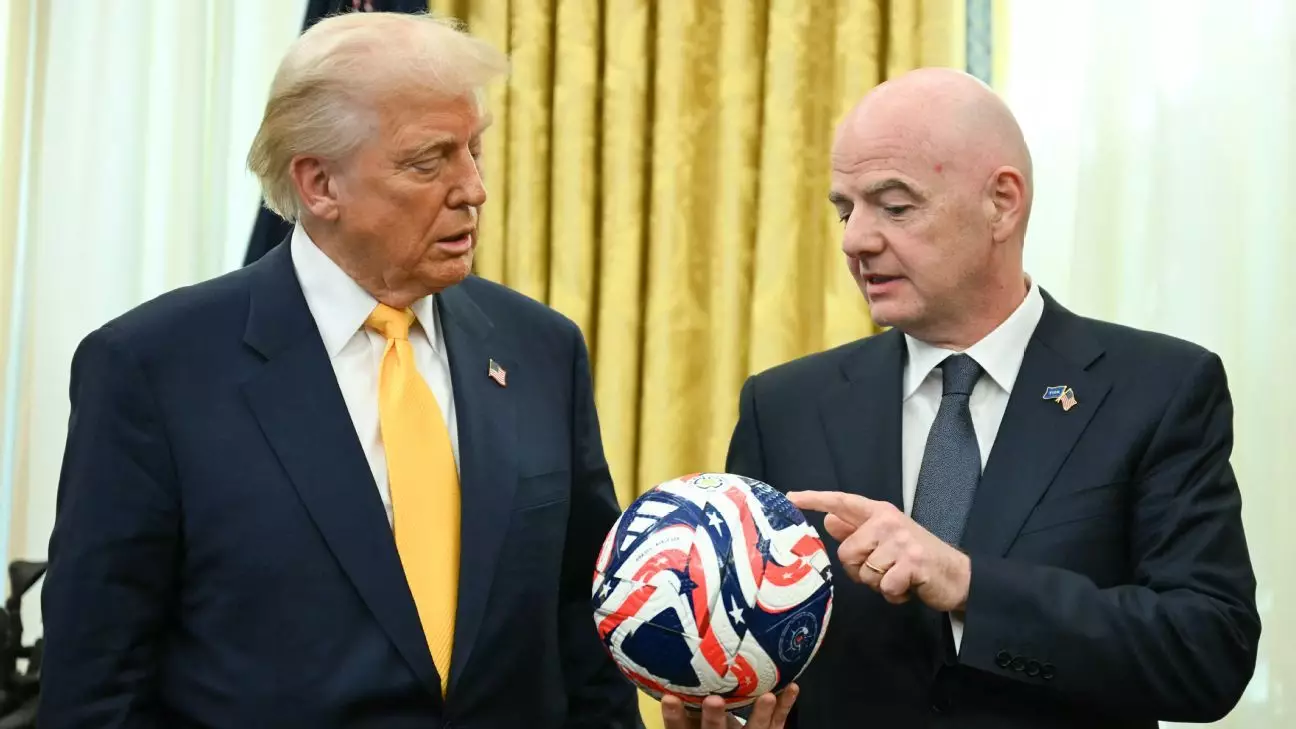In an unprecedented move, President Donald Trump has unveiled a task force devoted to the preparation for the 2026 FIFA World Cup, an event set to spotlight North America as a premier destination for global sporting events. This tournament promises to be monumental, not only for its scale—with 48 teams and 104 matches across the U.S., Canada, and Mexico—but also for its potential to foster cultural exchange and international camaraderie amidst a backdrop of geopolitical tension. While the idea of sport as a unifying force carries profound implications, this upcoming World Cup is poised to be a litmus test for diplomacy as much as it is a showcase of athletic prowess.
Sport Amidst Strife
On the surface, it may appear paradoxical that a sporting event can thrive amidst escalating trade tensions and political disputes. Trump’s own statements about “tension being a good thing” could be interpreted in ways that create discomfort for many individuals. The simplicity of sport provides a canvas upon which extraordinary narratives can be painted, yet it’s hard to overlook the geopolitical undertones that arise from a fractured relationship between the caretakers of the tournament. The ongoing discourse surrounding tariffs and trade negotiations raises questions about the overarching impact these factors may have on the influx of global fans, businesses, and media.
It is particularly disconcerting when one examines how Trump’s prior rhetoric against Canadian Prime Minister Justin Trudeau has stirred a renewed sense of national pride among Canadians—reinforcing identities amid a backdrop of camaraderie and perhaps even rivalry. When the World Cup arrives, these sentiments could manifest as both competition and collaboration, showcasing what global engagement can truly mean.
Preparing for an Unprecedented Challenge
With FIFA President Gianni Infantino highlighting the complexities akin to hosting three Super Bowls each day for an entire month, logistical and security challenges loom large on the horizon. While the 2026 World Cup is presenting an opportunity to elevate the sport in the U.S., it also calls for meticulous planning and execution, with the stakes higher than ever. From ensuring the safety of millions of visitors to creating an ecstatic atmosphere for fans, the task force will have its work cut out.
The U.S. has seen soccer morph from a niche pastime into a burgeoning cultural phenomenon, particularly among younger generations. However, hosting the World Cup illuminates both the progress made and the challenges that remain in solidifying soccer’s position in the American sports hierarchy. The fact that Trump has expressed a desire to witness multiple games reflects a broader yearning for national pride and unity through sport, potentially nudging the national narrative in a more optimistic, inclusive direction.
The World Cup as a Catalyst for Connection
The 2026 tournament offers a unique stage where nations with complicated diplomatic pasts can come together in a spirit of competition and celebration. Historically, events such as the World Cup have served as platforms to ease tensions and build international relationships. The notion that sports can transcend divisions is not just an idealistic fantasy; it is a window through which diverse cultures engage with one another.
The invitation extended to spectators from around the globe fosters a narrative of welcoming diversity and connection through shared experiences. In an era marked by division and discord, this World Cup represents an essential opportunity: to embrace our differences while momentarily uniting around a beloved sport. Infantino’s assertion that the visitors “feel happy” and “special” encapsulates a vision that transcends mere athletic competition.
Legacy and Future Implications
As the nation gears up for the World Cup, critical questions arise about the legacy of hosting such a colossal event. The 2026 World Cup stands as a precursor to the 2028 Summer Olympics in California, where similar challenges and opportunities for international engagement will arise. The manner in which the U.S. navigates both events could have lasting implications for its role on the world stage—balancing national interests with global responsibilities.
Ultimately, the task force’s success hinges not merely on orchestrating logistics but on leveraging sport to bridge political divides. Can this World Cup transcend the contours of national tension and serve as a template for future international cooperation? As teams prepare to compete and fans rally in fervor, the world will not only watch the events unfold but will also observe how sport, diplomacy, and humanity intertwine in this complex yet exhilarating endeavor.


Leave a Reply